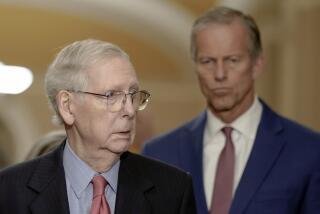Opinion: Democrats would be crazy to kill the filibuster

“Severe memory lapse” must be one of the (many) debilitating side effects that can result from being elected to Congress. I can’t think of any other way to explain why Senate Democratic leaders told the Hill that they won’t rule out killing the last vestiges of the filibuster if they retake control of the chamber in 2020.
Less than six years ago, Democrats led by former Senate Majority Leader Harry Reid (D-Nev.) ended the filibuster on presidential nominees for the executive branch and most federal courts. It was an act born of frustration — the Republican minority had resolutely blocked votes on all three of President Obama’s nominees to the Court of Appeals for the District of Columbia Circuit. But in doing so, Reid laid the path for Republicans to eliminate the filibuster on Supreme Court nominees after they retook the Senate and President Trump nominated his first justice.
That’s why Neil M. Gorsuch and Brett M. Kavanaugh are on the high court, despite attracting the support of bare majorities of the Senate. And why Trump has been able to flood the courts with his nominees, a number of whom have been rated unqualified by the American Bar Assn.
Notably, Reid made no move to kill the filibuster on legislation, which means that bills routinely require 60 votes to come up for debate on the floor, then 60 votes to go to a vote. His successor as majority leader, Republican Mitch McConnell of Kentucky, has similarly resisted the push from partisans to end the legislative filibuster, despite pressure from Trump just to steamroll Democrats and enact his agenda.
Now, top Senate Democrats are signaling a willingness to bar filibusters on bills too, should they reclaim the majority. According to the Hill, both Senate Minority Leader Charles E. Schumer (D-N.Y.) and Minority Whip Dick Durbin (D-Ill.) said the idea was on the table, which marks a considerable shift for Durbin. When asked why, Durbin told the newspaper that the status quo in the Senate was no longer acceptable: “This is a different Senate. It is unproductive under the current state of affairs.”
The best arguments for killing the filibuster are that it’s undemocratic and that it has been transformed from a rarely used tool to force compromises into a quotidien implement of obstruction. Both of those points are valid, yet the Senate is undemocratic and inefficient by design. Less populous states hold disproportionate power, given that the four senators from Idaho and Wyoming have as many votes as the four from California and New York.
The Founders’ intent was for the House to channel the passions of the electorate and for the Senate to cool them through a more deliberate process. The salutory effect of the filibuster is that it promotes legislation that has at least some bipartisan buy-in. Without that, you end up with embattled initiatives like the Affordable Care Act, which Republicans feel free to undermine because none of them voted for it.
Durbin is right, though, that the gridlocked status quo in Washington cries out for change. For more than a decade, Congress has been unable to get anything done on the biggest issues of the day. The only exceptions have come when power was concentrated in one party’s hands and the issue could be addressed through a budget bill not subject to the filibuster. The result: inaction on problems like our failed immigration policies, and purely partisan and often unsustainable actions on issues like healthcare and tax rates.
The fundamental problem here is that members have little interest in compromising or not enough incentive to do so. This is one of the bitter fruits of partisan gerrymandering that the Supreme Court ignored. When the only real threat to your reelection is drawing a primary challenge from someone more deeply partisan than you are, you don’t have much reason to work with the other side on solutions that neither side loves but both sides can live with.
Killing the filibuster won’t fix that. Instead, it will simply make federal law and policy more volatile, with statutes and regulations being whipsawed by each change in control of Congress. Granted, it makes little sense to allow two filibusters on every piece of legislation, as is the case today; ideally, senators would eliminate the filibuster on the motion to begin debate on a bill while preserving the option to filibuster the motion to end it. But then, any more to restrict legislative filibusters would probably hasten the end to all of them.
Lawmakers seem to be moving in only one direction on the filibuster, and it’s not the right one.
More to Read
A cure for the common opinion
Get thought-provoking perspectives with our weekly newsletter.
You may occasionally receive promotional content from the Los Angeles Times.







